#queer film theory
Text
AN ANGEL, A DEMON, AND A PLATE OF ROAST MEAT - QUEER INTIMACY IN GOOD OMENS’ “A COMPANION TO OWLS”
Spoilers for S2 EP 2 of Good Omens below the cut!
A “Companion to Owls”, the minisode pertaining to the second episode of the second season of Good Omens, brings us a significant reveal in that Crowley was the one to introduce Aziraphale to food. Deftly using the audience’s foreknowledge to bring illuminating tenderness to an otherwise simple scene, Aziraphale discovers the bliss of human food while hiding out an overhead storm. The scene plays out reminiscent of Hades and Persephone, a temptation and entrapment through food presented underground, or in this case a cellar. A more Christian-aligned interpretation of the scene lies in the particular observation that Crowley tempts Aziraphale into an innocuous bite that swiftly becomes an act of gluttony- a deadly sin not unlike the Garden. Just as humanity got quite a lot out of the whims of Crowley’s temptations, Aziraphale’s very first experience with food, which he comes to love deeply in arguable moderation, was an act of indulgence and gluttony. At a defining moment in his relationship with Heaven, his love for human food is not only contrary to the behavior of an angel, but sinful in itself.
Since the act of Aziraphale eating is doubly characterized as a deviant behavior, it bears credence to analyze how this scene fits into the broader themes inherent to Aziraphale and Crowley’s queerness. Throughout the first season, Good Omen’s themes of ostracization, divergence from expectation, rejection of the accepted, and a connection transcendent of standard human definition permeate the queer experience. Both Crowley and Aziraphale have been consistently coded alongside the queer expressions of the various eras they’ve lived through. In relation to each other, Crowley is arguably more experienced in the then-seedier parts of Soho and the elements of queer life that entailed. Aziraphale doesn’t lag far behind, but his experience lies solidly with a different crowd of queer folk. Contextualized within their continuing relationship to queerness, the scene in the cellar takes on an additional interpretation. In the simplest terms available that preserve the content of the scene: Crowley offers Aziraphale his meat, and Aziraphale gobbles it down.
Blunt, but accurate.
In a more nuanced discussion, queer intimacy on film has historically necessitated deep coding and subtextual theming to convey representation. While contemporary queer film has seen significant bounds in this regard, the long canon of coded queer intimacy has remained a staple of queer storytelling. Among the most commonly coded activities is eating, ostensibly a quotidian task with romantic and even sensual connotations depending on the people involved- thus the discussion of this scene. In the act of presenting Aziraphale with a plate of food, Crowley takes on an introductory and mentor-like role, stewarding Aziraphale into an experience familiar to himself but novel to his companion. Aziraphale reacts in a manner of initial repulsion at the temptation, to concession to his desire and curiosity, to performance of expected disgust, and finally to uninhibited indulgence. Beat-by-beat, this sequence in the cellar follows the rhythm of an experienced queer person guiding someone’s “first time”. Notably, this scene is intense and invokes a strange sense of voyeuristic discomfort, but remains a non-sexual display of intimacy, adhering to many fans’ (myself included) interpretation of Aziraphale and Crowley as asexual and exploring what non-sexual modes of intimacy look like. As Aziraphale eats, Crowley holds the plate and watches with a smug smile on his face– Aziraphale has accepted and is now joyously partaking in the nonconformist behavior he discovered long ago.
Even beyond this particular scene, the pairing’s frequent outings are frequently justified by a “temptation” to lunch, dinner, or a drink often initiated by Aziraphale (e.g. Aziraphale “tempting” Crowley to try oysters in Rome, and Aziraphale “tempting” Crowley to “a spot of lunch” after switching back corporations as the most explicit examples). As such, the act of eating remains an act of intimacy between the two, if nothing more than a pretense to spend more time in each other’s company while hiding their true sentiments from Above and Below.
#good omens#good omens season 2#go s2#crowley#aziraphale#good omens 2#good omens 2 spoilers#good omens season 2 spoilers#s2ep2#a companion to owls#neil gaiman#good omens spoilers#ineffable husbands#queer theory#queer analysis#film analysis
147 notes
·
View notes
Text
While studios constantly push actors to discourage fans from having queer readings of the story they appear in and seek to diminish the validity of that reading, while allowing or even encouraging heterosexual readings, these quotes always stick with me:
"When I suggested to Sean that he take Elijah's hand... it was because I thought anyone who would care about the deep friendship (often of an innocent physical nature) ... I thought that might be missed by two resolutely heterosexual actors who might not appreciate that gay people, like myself, saw in a touch something, perhaps, more meaningful than others might."
-Sir Ian McKellen
“All the reading I was given to do in school was always heterosexual, every movie I saw was heterosexual, and I had to do this translation. I had to translate it to my life rather than seeing my life. Which is why when people say to me, “Your work is not really gay work, it’s universal.” And I say, “Up yours. It’s gay. And that you can take it, and translate it to your own life is very nice, but, at last, I don’t have to do the translating. You do.”“
-Harvey Fierstein
#personcole#lgbt#lgbtq#lgbt+#lgbtq+#lgbtqia#lgbtqia+#queer#queer theory#film theory#fandom queer fandom#that old seb quote making the romantic reading look like it somehow diminishes the story got me thinking
261 notes
·
View notes
Text
and like, I do understand plagiarism in certain cases. in my freshman year writing class, there was a girl who copied other people's stuff constantly. she copied other classmates, she copied me, she copied from random web sources, which, bad idea, don't do that, but I get why. she spoke english as a second language and freshman writing is a required course that was significantly harder for her than for everyone else in the class, and honestly I do not care if people manage to cheat off my school work as long as it doesn't get me in trouble if they get caught. but why on god's green earth would you decide to become a youtube video essayist, a job where you largely set your own deadlines and standards for quality, and plagiarize all your work? bro this can't have been your only option. do something else with your time. bro.
#even just pitching yourself as 'guy who makes adaptations of books about queer film theory' would have been substantially better. bro.#marina marvels at life
101 notes
·
View notes
Photo
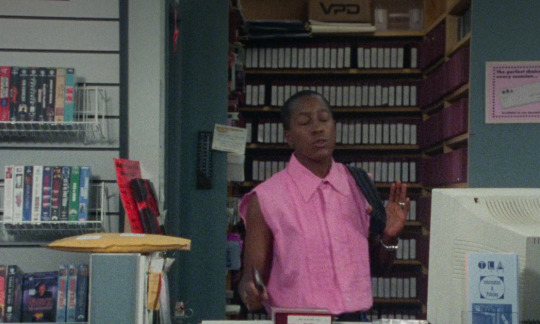

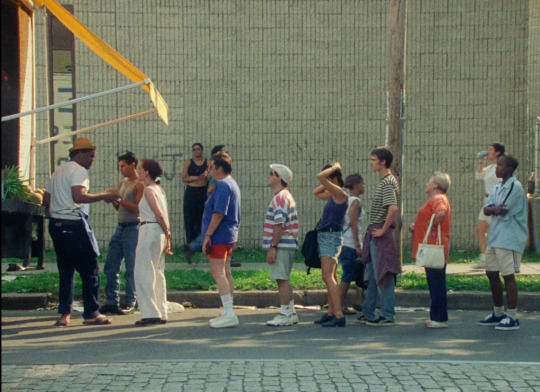
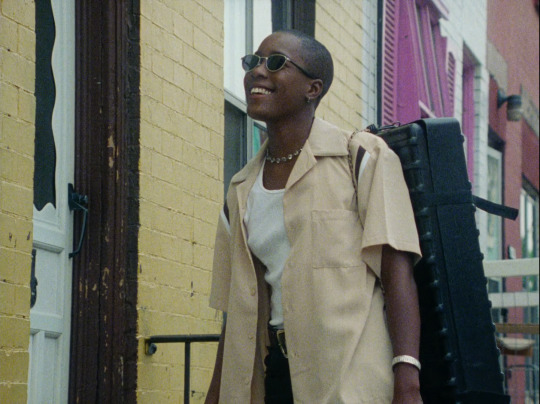
The Watermelon Woman (1996)
#the watermelon woman 1996#cheryl dunye#fae richardson#the watermelon woman#film#film scenes#cinematography#film stills#colour theory#90s films#queer films#documentary#beautiful cinema#cinema
360 notes
·
View notes
Text
Will Byers, Coming of Age, Transformations, Predators, Queerness & Teen Wolf
There’s one part of the “leaks” that sappicjopper put out that really caught my attention—
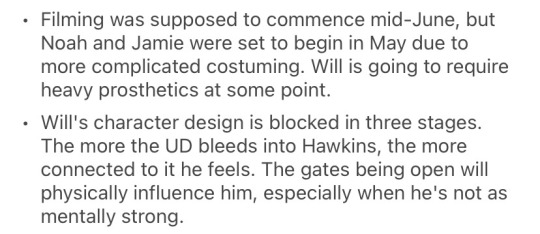
And as to not look naïve, yes I am highly aware that these “leaks” are likely fake. However, disregarding the legitimacy of this as a “leak,” it is in itself a compelling idea that does have some legs to stand on as a theory.
So awhile ago I made a post about Will’s coming of age story and how that fits into the horror genre, and how exploring coming of age and sexual awakening through the supernatural is a popular trope.
I wanna point out three films I use in my analysis, Ginger Snaps, Jennifer’s Body, and Black Swan. These films have a lot of things in common, but one aspect I want to point out is there use of physical transformation.
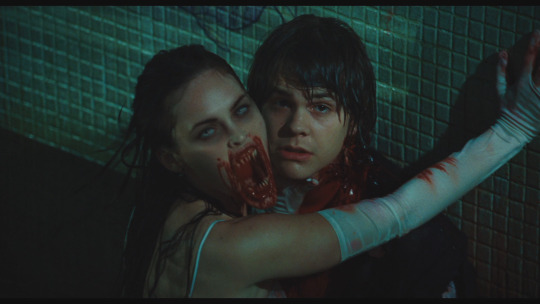
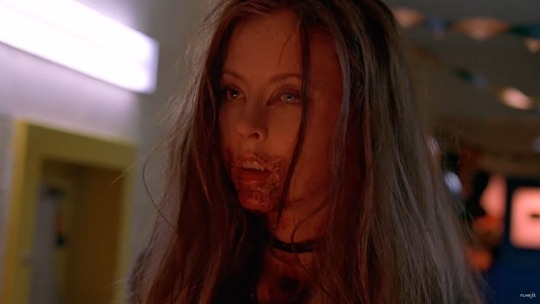
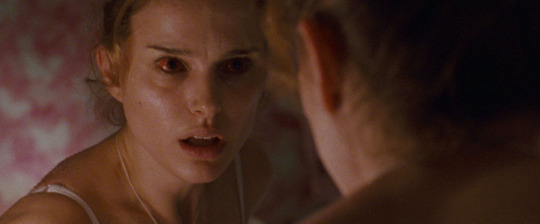
These transformations covers an umbrella of different themes depending on the character, but something that all three of them have in common is sexuality. As all of these women become more sexually liberated, and thereby seen as dangerous by those around them, they fall deeper into these physical transformations. (IE Jennifer and Ginger both eating men after they have sex with them)
In my original post I also discuss how this fear of sexuality, or view of sexuality as something monstrous and predatory, is related to queerness. Both Jennifer Check and Nina Sayers are visibly queer characters in both their respective films.
So what? All of this is very speculative, how do I know that Will is going to go through a similar arc, just because I can relate him to a few movies that I like personally? How do I know that the Duffer’s are going to do something similar? Is there reference to a movie within in the show, that features transformation as an allegory for coming of age and queerness?
Actually, there is.
All credits goes to @chirpsythismorning for their deep dive post into the shows use of the film Teen Wolf, which appears in the show as one of Rick Conroy’s recent rentals as well as the poster in the background of a few shots.
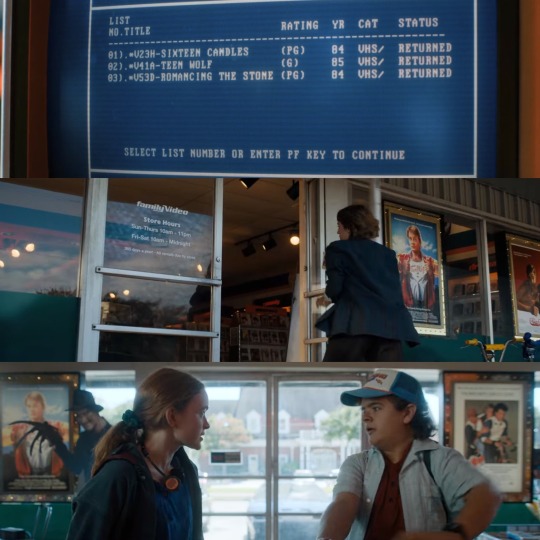
(screenshot credits to @chirpsythismorning)
The Freddy Krueger standee, the character who kills people in their dreams whose actor makes a cameo in the show, positioned right over Max’s shoulder should be enough to say that the film references in the background are a lot more than just meaningless references.
Teen Wolf is a 1985 supernatural coming of age movie about a teen named Scott who learns that he is a werewolf.
Within s4 we actually get some parallels between the film and Lucas’ arc— Scott is a basketball player who seeks popularity before embracing who he is and what he really wants. However, I think it’s possible that the film could also be a piece of foreshadowing for Will’s arc in s5.
While Scott is not an explicitly queer character, there is some coding within the film that correlates his lycanthropy with queerness. Remember this is a mainstream teen movie from the 1980’s, if there’s going to be any queerness it’s gonna have to come from subtext, although it is pretty unsubtle.
There’s this very heavy handed scene where Scott confesses to Stiles that he’s a werewolf, and Stiles believes that Scott is coming out to him initially.
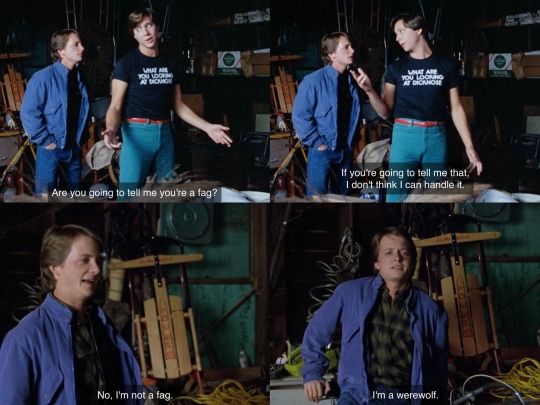
There’s also this conversation Scott has with his father that can be read as queer coded.
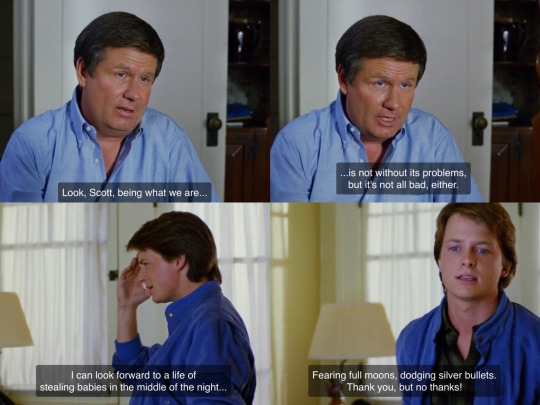
Or essentially saying, being queer isn’t easy, but it’s not bad either. And then Scott equating his queerness with being a predator, and expects to be hunted as such.
When Scott goes through his first full transformation, it’s right after he played a game of two minutes in heaven with his childhood friend Boof, equating sexuality with his beastlihood.
In s4, there’s a big emphasis on the word predator.
Will’s queerness is an open secret in a town that believed he was “killed by some other queer” and that a group of satanic sodomizers are responsible for murder. I’m willing to bet that that predator label is going to be put onto Will, especially as he begins to come more into his own sexuality.
What would be a literal way to portray this predator title? By having him transform into a predatory creature, just as everyone sees him.
Am I saying Will is going to become a werewolf? Well no, that wouldn’t really make sense with the show. But there is something that may have even been foreshadowed in the show.
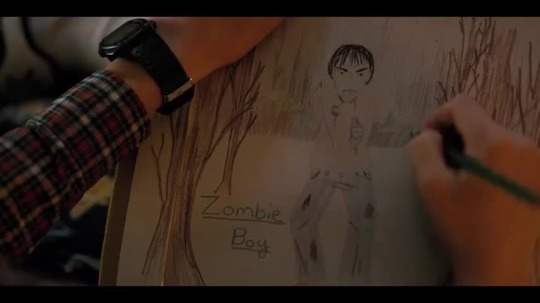
How would this transformation even happen? Well, as our “leaker,” or rather, enthusiastic theorist suggests, it has something to do with his connection to the Upside Down, which is progressively leaking more and more into Hawkins. So not a literal zombie, but maybe a zombie like creature that could survive in the Upside Down.
When Vecna was sent through the gate to the UD we saw him go through a physical transformation as he adapted to his environment. This would he a like a speedrun version of that amplified by Will’s own personal connection to the UD (which I believe predates his kidnapping)
It would also serve as a way to highlight the parallels between Vecna and Will, what by having Will physically become similar to him. What better way to show the Vecna/Will mirrors by having Will look in the mirror and see the spitting image of Vecna staring back at him.
Bonus: Scott in Teen Wolf in played by Michael J. Fox, and which character was dressed similarly to a popular Michael J. Fox character in season one?
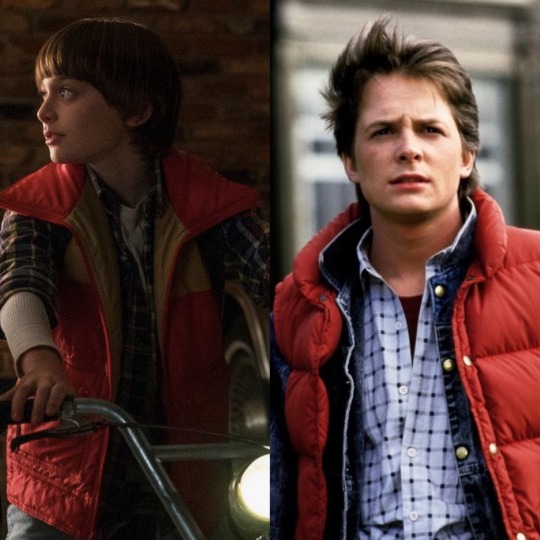
#will byers#byler#<- target audience#stranger things#will byers has powers#i left out the cannabalism bit because thats more of wishful thinking on my part#…but it does conveniently tie in with the idea of being a predator#and is common with these transformation trope films#maybe he should eat people!!#tw cannibalism#just for those tags lol#also just so i dont get accused#im not trying to steal aspects of lucas’ story just to slap onto will#just saying that the teen wolf parallels can apply to both characters#lucas has more of his overall arc and will has the transformation queer allegory arc#stranger things theory#my theory
161 notes
·
View notes
Text
The Inescapable (and Comforting!) Queer Lens of Moonlight Chicken and The Eighth Sense
I've watched quite a few BL series over the last few years, but something that's struck me (and others I've noticed from tumblr discourse!) is how two recent series Moonlight Chicken (Thai BL) and The Eighth Sense (Korean BL) both embody not only characters and a plot that centralize on real queer experiences, but also a distinctive lens that makes them so achingly and relatably queer that it would be a disservice to not dissect and analyze!
(Please bear with me as we tackle some foundational background info *cracks knuckles* so--) The lens is a really cool means to understand a piece of media because it's an artistic approach from the filmmakers to show us the world through a controlled perspective. The lens has a certain focus (also dubbed focalization). In Looking in: the art of viewing, narrative theorist Mieke Bal describes focalization as the relationship between point of view in a story alongside the vision/meaning that the observer consumes of said pov. So not only does the lens convey certain emotions, but it's the observers (aka audience watching the show) who add additional meaning to it.
This relationship gets really interesting to look at when you consider that traditionally a lot of BL has been created for straight women as a sort of fetishization of gay men (I'm generalizing here, but consider a lot of BL that feels like a straight couple dynamic).
But with these two recent series, the lens feels different. It feels like it's been filmed not only in a way that conveys queerness, but for a queer audience. This focalization creates a really special dynamic between the media and its relatability. It's one of those things where I feel like you just have to be gay to understand it, and that's probably why so many of us have found solace in these two series!
For these two works in particular, there's an undeniable focused aesthetic examination of how queer people see the world and interact with it. There's an artistic emphasis on how one's queerness is inescapable and omnipresent, and how it paints our character's world.
Let me stop rambling and try to show what I mean.
In Moonlight Chicken, this omnipresence is observable in the way the characters Wen and Jim meet in episode one. Wen gets drunk at Jim's restaurant, trying to stall on going home to his ex. The way the camera work plays out during this scene perfectly captures how queer people find and recognize one another without having to overtly express their queerness. Consider the first conversation they have after closing hours of the restaurant: the lens is focused on how subtly they are drawn to each other. There's the wide shot of both of them sitting and talking, something that may be dismissed as nothing more than a two-person shot, yet the way their bodies take up so much of the frame welcomes us to notice their body language and how open they are to one another. This, coupled with the alleyway shots later that cut to individual close ups of their faces, sometimes briefly scanning the other's, a mixture of hesitancy and recognition shaping their reactions, is so queer coded!!! Like!!!!! Hello??? I love how it all culminates to Jim saying "I don't have a wife yet...I'm sure you know my preference" like LMAOOO my dude.....it's been more than obvious but I'm glad you're saying it out loud.
I guess what I'm getting at here is that the way this has been filmed is so beautiful and comforting because it depicts how queerness is inextricably tied to how we process our world. It's in the way we instinctively tag others as being in or out of the community and find solace in that recognition, all while teetering the boundaries of our attractions and carefully assessing a situation to see whether the feelings are mutual, misinterpreted, or if it's safe to express who we are.
Moonlight Chicken manages to embody all of that in the most mind blowingly subtle ways across ALL OF ITS CHARACTERS!!!! I've never encountered any other show like it - it's simply stunning, and it's set the bar way too high now.
We also witness this comforting queer lens in The Eighth Sense. So far only two episodes are out, but the way this show has been filmed is already so much more mature, graceful, and emotionally relatable than most other BL shows I've seen. And again, I think this is because the filmmakers have utilized a lens that conveys how queer people see and interact with their world in a way that other BLs have failed to accomplish. The narrative focus is so strongly centered on our protagonists living in a straight world while they navigate and (in Jae Won's case) want to hide their queerness.
Here, the queer lens resides in the way the camerawork establishes a sense of evaluation and hesitancy. It's the way the camera lingers on how Ji Hyun shrinks a bit when the surf instructor lady jokes "you came here cause of the pretty girl on the poster didn't you?" or the way we get close up shots of Jae Won's annoyed face as he demands his friends stop asking why he broke up with his ex girlfriend. As a queer audience, these subtle clues are just so relatable. It's a reflection of our own lived experiences, of bottling up our inner selves and constantly having to monitor our reactions and behaviors in a straight landscape.
These shows aren't just giving us gay characters who Meet Cute and fall in Love and deal with some turmoil and live happily ever after - they are filmed in a way that forces us to see and be seen.
And I can't get enough.
#there's still so so much to say about both of these shows#but consider this a preliminary brain dump#tagging this under#rebecca should have minored in film studies or queer theory#moonlight chicken#the eighth sense#queer theory#film analysis#media analysis#여덟 번째 감각
79 notes
·
View notes
Text
hi! i'm canis, i use it/he/they pronouns, and i am a mentally and physically disabled young adult with a special interest in horror!
horror exists partially to vent personal and cultural anxieties and fears, and i would like to nonjudgementally find out why so much of modern horror surrounds the fear of physical and mental illness, injury, and disability.
posts will include trigger warnings as well as links to doesthedogdie.com , a great resource if you have the energy to parse through it
#queer horror#disabled horror#scared sick#horror#malevolent#saw#tma#silent hill#resident evil#hereditary#film theory#film analysis#horror analysis
15 notes
·
View notes
Text
MatPat retiring, Stranger Things ending, and my turning 25 have reminded me there is an entire generation of neurodivergent, queer youth growing up with an entirely different internet than the one that raised us, and I’m not going to lie, it stings. The internet saved my life and I pray today’s youth have the privilege of discovering the magic of found family, community, and belonging the internet creates. It’s a sacred existence known only to those who need it most. We must protect what we have so the lost souls of tomorrow can find their way home. Thank you to those who have stuck around, your work goes far beyond the screen. ❤️🩹🥹
#stranger things#good mythical morning#rhett and link#markiplier#matpat#game theory#film theory#mental health#queer community#neurodivergent#actually autistic#youtube#netflix
10 notes
·
View notes
Text
Me deciding it’s a good idea to explore Nicholas Galitzines back catalogue of films (avoiding Cinderella at all costs - no amount of money could make me rewatch that train wreck) for reasons! and I found one called Handsome Devil - and Irish indie film from 2016 which is very dead poets society but queer!
I really enjoyed it, it has a great cast (Andrew Scott anyone!!) even if it was a bit slow in places and my little colour theory heart was overjoyed because they used the yellow/blue colour way I keep going on about in queer films and tv - I really am going to have to go on a research binge and find out how that got started as a thing aren’t I!

Look at those cheek bones!!!!
#yellow blue colour theory for the win#Nicholas galitzine plays queer characters so well#I’m gonna go on a research binge now arent I!!!!#queer film#film rec#nicholas galitzine
20 notes
·
View notes
Text
Y’all seen the analysis around Suzie’s house growing lately??? There’s more theories about it every single day, and the new popular take is that it’s mostly from Mike’s POV and what that means for everything that went down and what the Duffers were trying to tell us in those scenes and it’s just… holy shit bonkers
#stranger things#byler#suzie’s house#stranger things meta#stranger things theory#it doesn’t get better than the byler/queer coding in Suzie’s house#the duffers are gonna have a whole masterclass on all the scenes at suzie’s house#green tent in the yard 👀#the fact that they show it to us twice… both when they go in the house and when they leave…#the lights going out right when Will looks at Mike#and then we just hear Eden yell CORNELIUS!?!?#MIKE BEING THE ONLY PERSON IN THE FRAME WHEN ARGYLE FALLS IN LOVE WITH EDEN AT FIRST SIGHT AND LOOKS DISGUSTED#his monologue was a rip off of argyle and Eden… that’s why she had a key lock on her necklace… she was a key to one of the biggest questions#like… holy shit#poetic cinema#storytelling through film at its peak#go check out#causeineedu#on tiktok if you wanna see all the theories on it!!#that’s not all of it but they mentioned some that I didn’t pick up on at all so worth checking out regardless
140 notes
·
View notes
Text
the grinch IS a queer movie. to me. stupidest hill im willing to die on. the grinch is a he/him butch dyke living a freegan nudist life up the side of a mountain. & the horniest femme in town has been Obsessed with All of That since they were kids.
#u know. queer monster theory#it's about gender its about prejudice its about attraction to what you've been told should be repulsive#its about hating cops and the mayor. its about ur lesbian mams having swingers parties.#I'm not into the grinch myself but i recognise him in MANY old punks of my acquaintence#u must realise that if the grinch wore clothes he would be wearing a leather jacket#this is about the jim carey live action movies idk about the others#the grinch#film#We're so starving#me fein#its about being an old cantankerous bastard who lives in a dump outside of town idk what to tell you.
64 notes
·
View notes
Text
Just finished MatPat’s goodbye video
I am actively crying /srs
I actually love him so much
His fucking shaky crying ass is crushing my heart into a million pieces
This is making me so fucking emo 💔💔💔
I’m gonna miss him so much but I am so excited for the future of this.
I’m so glad the new hosts are gonna be people we already know and love
I am VERY excited for Tom theory
And I am MASSIVELY excited for all of his future projects
I’m so so SO fucking glad he’s not truly leaving
I can live without his stupid voice saying the stupid things about the stupid games if it means I can see him do so much more /pos
Sigh I just don’t even have words
I love him so much and I am so proud of him
#and remember#that’s just a theory#A GAME THEORY#thanks for watching#matpat#matthew patrick#game theory#the game theorists#gtlive#film theory#food theory#style theory#queer#trans#neurodivergent#audhd
18 notes
·
View notes
Text
Many people say the conflict would have been solved if Goncharov and Andrey simply had gay sex but did you know in the original uncensored script they actually did!?
The scene scrutinized for its portrayal of infidelity and explicit male homosexual acts was considered so shocking and banned in violation of the Motion Picture Production Code (better known as the Hays Code) even though to go around it both characters still tragically died, making it an instance of the Bury Your Gays trope making its way in Hollywood.
Ironically the MPPC was dissolved in 1968, after already leaving a mark on the movie (whose turbulent production lasted 7 years before the final premiere in 1973)
So no unfortunately Goncharov and Andrey having gay sex wouldn’t save them…
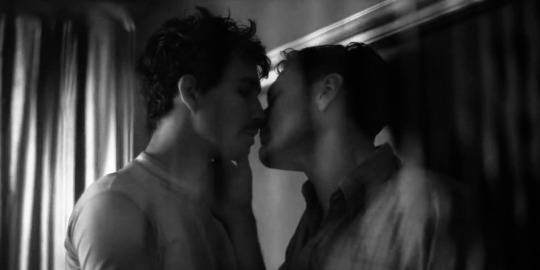
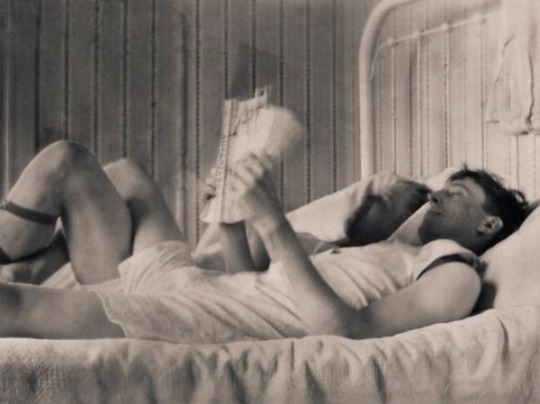
(Pictured a rare still from the deleted scene)
#goncharov#goncharov (1973)#martin scorsese#movie trivia#queer history#film theory#robert de niro#unreality
68 notes
·
View notes
Text
barbie as a trans narrative. someone who no longer fits into the world they were assigned into. she has to go places she never thought she would go, meet people she never thought she would meet. she discovers a new exciting world where she is both dehumanised, objectified and abused but also feels more alive than she ever has before. she experiences earth shattering new things she never thought she would be able to experience. the severe difficulties of this new world breifly make her want to go back to her old one, but when given the option to be put back in a box and live her life exactly the way she used to, she knows she cant do it. she wont do it. she meets other people like her, who support her into self discovery and self acceptance. "Its like I'm a woman already' 'Welcome!' 'God, Is this what it's like?" "I don't really feel like Barbie anymore" "Being [a woman] isnt something you ask for or even want, its just something you discover you are?" being euphoric at going to her first ever quote-on-quote 'female' medical appointment, and being so excited to use her brand new name at the reception. accepting her new life with all its joys and all its hardships bc she knows it's the best possible life for her."I want to be the one imagining not just be the idea". CMON BARBIE LETS GO PARTY 🏳️⚧️🏳️⚧️🏳️⚧️
#turning off replies in advance#u cant catch me terfs#barbie#barbie 2023#greta gerwig#trans#transgender#transgirl#trans narrative#film theory#trans film theory#barbie theory#transisbeautiful#hari nef#trans joy#queer joy
10 notes
·
View notes
Text
“The film [The Boys in the Band] produces a distinction between the cultivated practice of gay male judgmentalness (or “bitchiness”) and the faculty of critical judgment. Yet it does not place these categories in a developmental narrative, in which an individual evolves out of the former into a mature, “adult” capacity for objective judgment. Rather, The Boys acknowledges the conceptual power of both judgmentalness and judgment in gay male social life, while stressing the importance of distinguishing them. In the narrative, judgmentalness ironically functions as a form of gay male community building. It is a highly developed code of verbal sparring that requires common cultural references and the recognition of others’ personal characters. When deployed outside the gay male collective, judgmentalness is a useful weapon against homophobia, a cultivated condescension toward straight culture and its banal, normalizing force; within the gay male social milieu, it often functions as a loving form of social antagonism among friends that implies an intimate “knowingness” of one another’s flaws... The Boys takes this willingness to express judgmentalness to the extreme, making accountability, rather than nonjudgmentalness, its central value.
…
If gay male judgmentalness can produce alternative intimacies outside the gaze of societal and clinical homophobia, critical judgment serves as a tool for holding other gay men accountable for their speech and actions. Critical judgment involves the capacity to take in multiple viewpoints on the same circumstances to form substantive about them that have qualitative weight—that is, not simply pointing out inadequacies or problems but suggesting what should be done about them…. Critical judgment then, is about the production of normative standards of social conduct. If a certain loving bitchiness brings gay men together, a clear-eyed critical judgment allows them to stand apart, call one another out, and hold others accountable. According to The Boys in the Band, both are crucial to the maintenance of heterogenous community; it is their conflation, or the inability to distinguish between them, that is destructive of collective life.”
Ramzi Fawaz, “Beware the Hostile Fag,” Queer Forms
#queer forms#queer history#writing#queer theory#the boys in the band#ramzi fawaz#malicious gay faggotry#film criticism
49 notes
·
View notes
Text
i love watching a semi obscure and often not very good old movie bc uh. woman. and then walking away with niche and in depth queer interpretations of the film and like having a mental conspiracy board and being like do you see it? do you see the vision? but like no. you haven’t even seen the movie lol
#tkb and otzi thanks for seeing my visions lol…#if you want to know what I am vaguing about. there are in fact a lot of things. I was going to make a list but there are a lot and I’m also#like well this is sometimes me thinking about the women (a good and fairly well known film) as a dyke drama (not a wide held or strongly#textually supported take) and sometimes this is me talking about sylvia scarlett (not a good film semi well known) and its many#layers of queerness in terms of both gender and sexuality (some of which are like. textual and some of which I am pacing and explaining to#anyone within hearing distance lol) and SOMETIMES this is me talking about like. fours a crowd (a very meh movie not#well known) and being like hey. polycule! (it’s called fours a crowd lol but other than that not a ton of support for this theory to the#layman who isn’t always grasping at gay little straws)#if you do actually want specifics or elaboration my ask box is always open lmfao#anyways I know this reads as sarcastic but I do genuinely enjoy this. I just also wish that I could have a captive audience that I could#make watch these movies and then explain the vision to and have them yes and me. hire me as a film professor I have no#qualifications for it and probably wouldn’t really do a curriculum anyone is asking for but I#sure would personally have a lot of fun!#my post#ham rambles (hambles)#old hollywood
3 notes
·
View notes